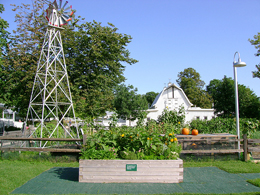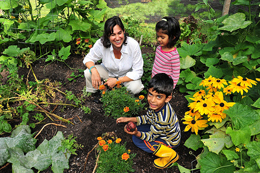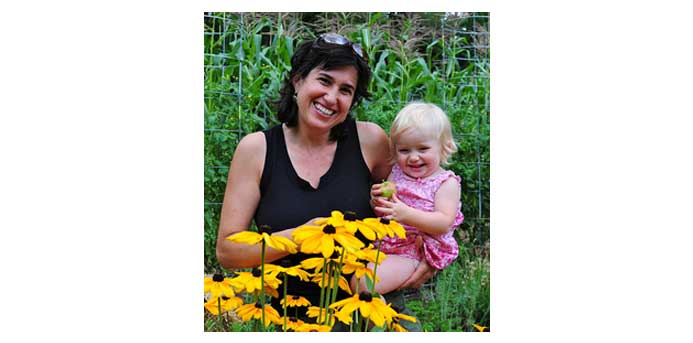For many of us, the organic awakening came when we read a book by Michael Pollan or saw the film “Food, Inc.” But Jeanne Pinsof Nolan of Glencoe recognized the importance of organics more than 20 years ago.
In the late ’80s, Nolan walked into a health food store out-of-state and happened upon some organic food. She asked what it was, and discovered that the food she’d been eating her entire life was full of chemicals.
“That was an epiphany moment,” she says. She was shocked and outraged.
The experience led Nolan, a North Shore native, to work on organic farms for 17 years after she graduated college. And she’s channeled her knowledge of organic farming into her business, The Organic Gardener, which helps people on the North Shore build organic gardens.
For Nolan, her job is bringing a little bit of the farm lifestyle to the North Shore.
“There’s a grounded, connected feeling,” she says. “I try to help other people bring that into their own lives. It’s a European approach, and a slowing down.”
And because growing vegetables keeps her sane, gardening was an absolute must when Nolan moved back to the North Shore to be near her family is 2004. “You’re going to go crazy,” her mom warned—so she built a gorgeous garden at her parents’ house, the first project in her North Shore portfolio.
 Not long after, she met Abby Mandel, founder of Chicago’s famous Green City Market, and Mandel asked Nolan to create a children’s garden in the Lincoln Park Zoo. The result was the Edible Gardens, a joint project between the zoo and Green City that’s now in its sixth season and has served more than 2,000 schoolchildren from all over Chicagoland.
Not long after, she met Abby Mandel, founder of Chicago’s famous Green City Market, and Mandel asked Nolan to create a children’s garden in the Lincoln Park Zoo. The result was the Edible Gardens, a joint project between the zoo and Green City that’s now in its sixth season and has served more than 2,000 schoolchildren from all over Chicagoland.
“Our commitment is that every child who enters gets to do hands-on work,” she says.
Nolan has also helped more than 300 families on the North Shore—and several schools—start organic vegetable gardens. For some, she and her staff of 5 are very involved, planting alongside the family and treating the garden as if it was their own. For others, who want to do most of the work themselves, she’s simply a consultant. Her gardens can cost anywhere from $200 to $10,000 or more.
“I’m here to help people enjoy growing food and succeed at it,” she says.
She’s also donated her expertise and services to organizations including Go Green Wilmette, Nurture, the Chicago Botanic Garden and the Hadley School for the Blind. And she’s accustomed to giving back, having lived for almost two decades on farms where she worked in exchange for room and board.
“I did what I loved to do, to change the world and make it better,” she says.
And back home on the North Shore, she’s still working to change the world.
 “As much as it sounds small and innocent, [organic gardening] is a huge life switch and the answer to a lot of problems that we’re dealing with,” she says.
“As much as it sounds small and innocent, [organic gardening] is a huge life switch and the answer to a lot of problems that we’re dealing with,” she says.
She regularly meets moms who are stressed out about what their children are eating—and she worries about two young kids. And gardening can calm some of this fear: Studies have shown that children eat more fruits and vegetables when the product is homegrown.
And gardening is also about slowing down and families reconnecting.
“We need to get out of our houses, off our cell phones, and out from in front of our TVs, and growing vegetables is a great way to do that,” Nolan says. “A vegetable garden is a little sanctuary, to be together, cultivate family values and learn about life.”

